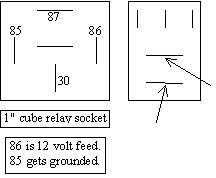Okay, first of all you should understand that it is normal to have no voltage to the fuel pump. Voltage will appear there for just one second after turning on the ignition switch. You should hear the hum of the pump for that one second. The voltage must return during engine rotation, (cranking or running).
You must also check for spark when you have a no start condition. Too many people find just the fuel pump dead or just missing spark and get hung up on that one system. An easier place to look is the feed wire to the ignition coil, any injector, or either small wire on the back of the alternator. It should be dark green with an orange stripe. A digital voltmeter might not respond fast enough so if you have a test light, that might be more accurate. It should light up for one second when you turn on the ignition switch, then go off. If it does, that proves the automatic shutdown (ASD) relay and wiring are okay and the Engine Computer has control over it.
What is important is that voltage must come back during cranking. If it does, then you must continue diagnosing just the fuel pump or spark circuits, but it's much more common to find the voltage does not come back during cranking. When the computer turns the ASD relay on for the first second, it is usually okay. THEN, when it doesn't turn on the relay during cranking, suspect the crankshaft position sensor or the camshaft position sensor. It's the signals from those two sensors when the engine is rotating that tells the computer to turn the ASD relay on.
If the Check Engine light turned on, there will be at least one stored diagnostic fault code in the computer. That will lead to the circuit that needs further diagnosis, but usually it will just be caused by a defective sensor. If there is no code in memory, a scanner that can display live sensor data is needed. It will display both sensors and "no" or "present" for those two signals. If the Engine Computer is recognizing both signals as present, but not turning on the ASD relay, the computer itself could be defective, but that isn't common.
Tuesday, November 15th, 2011 AT 12:13 AM




